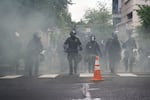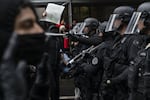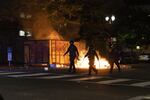A federal judge has placed formal restrictions on the Portland Police Bureau's ability to use tear gas on protesters, citing evidence officers have used excessive force in scattering recent demonstrations.
In an order issued Tuesday night, U.S. District Court Judge Marco Hernandez granted a 14-day temporary restraining order on the PPB's use of the gas. The city continues to see nightly demonstrations demanding racial justice.
"The declarations, in this case, show that PPB has regularly used tear
to disperse peaceful protesters," Hernandez wrote. "It is likely that it will continue to do so. The risk of irreparable harm is further heightened by the context in which these protests are occurring."
But while Hernandez seemed to side with plaintiffs who sued the city and have argued that the use of gas has been indiscriminate and unconstitutional, he did not grant the relief they sought. Police are still able to use tear gas during the two-week restraining order, Hernandez ruled. They just have to follow their own rules.
"The Court therefore orders that PPB be restricted from using tear gas or it's equivalent except as provided by its own rules generally," Hernandez wrote. "In addition, tear gas use shall be limited to situations in which the lives or safety of the public or the police are at risk."
The ruling amounted to a sort of half-win for the group Don't Shoot Portland and two individual protesters who sued the city last week over the tear gas grenades that had become a common feature of protests playing out nightly in downtown Portland.
"We'll see if it's a win based on what happens on the streets in the next week," said Jesse Merrithew, an attorney for the plaintiffs. "If PPB stops gassing people, then it's a win. If it doesn't change what's been happening on the streets then we didn't accomplish our goal."
Another attorney for the plaintiffs, Juan Chavez, said the order will make it easier for his clients to hold police accountable if they fail to follow bureau policy around deploying gas.
"What the judge is doing is putting in an order that allows the plaintiffs to have a fast track to a contempt hearing," said Chavez, who works at the Oregon Justice Resource Center.
Earlier in the day, Merrithew and attorneys with the city appeared before Hernandez via teleconference to make their cases, both impressing upon the judge the importance of his ruling.

Portland police used tear gas and rubber bullets to disperse protesters from near the Justice Center an hour before the 8 p.m. curfew went into effect on May 30, 2020. The protests were against racist violence and police brutality in the wake of the killing of George Floyd by a white Minneapolis police officer.
/ OPB
“We know that the protests will continue tonight, tomorrow and indefinitely into the future,” Merrithew told Hernandez at the hearing. “If this court does not act, it is a certainty that police will use tear gas against protesters again.”
Lawyers for the city, meanwhile, argued that tear gas is a vital tool, used only when demonstrations get sufficiently out of hand.
“The city is not always perfect, and its response to protest is not always perfect,” Deputy City Attorney Naomi Sheffield said. “The city certainly hopes that, with or without this order, there won’t be any further need for riot-control agents. But the city would ask that the court not take the unprecedented step of entirely eliminating this tool.”
Related: Don't Shoot PDX Sues Portland Over Police Use Of Tear Gas
The lawsuit against the city alleges Portland officers have used “indiscriminate, unchecked, and unconstitutional violence against protesters” by repeatedly deploying tear gas against large crowds that have gathered in downtown Portland since May 29. That force is a violation of First Amendment free-speech protections and Fourth Amendment protections against unreasonable seizure, plaintiffs say, and should be prohibited.
Plaintiffs asked Hernandez not only to immediately issue a temporary restraining order against the Portland Police Bureau’s use of gas on protesters but to issue an injunction on using gas as a crowd control measure moving forward. Plaintiffs have also requested that the city be required to create new policies for using crowd control weapons.
Portland police use a substance known as CS gas to scatter demonstrators by causing extreme discomfort, coughing, watering eyes and snot discharge, among other possible effects. A similar substance used by the city, known as OC gas, is more akin to pepper spray.
Plaintiffs argue Portland’s policies allowing use of these weapons against crowds are unconstitutional. Even if they’re not, they say, they are too often used on largely peaceful gatherings where only a small portion of people pose a threat.
“PPB’s actual practice and custom is to allow the use of tear gas against a crowd even when a substantial number of people in that crowd, or even the majority of that crowd, have engaged in no criminal acts and are not a danger to any person,” the lawsuit said.

Portland police used tear gas and rubber bullets to disperse protesters from near the Justice Center an hour before the 8 p.m. curfew went into effect on May 30, 2020.
Jonathan Levinson / OPB
In a response submitted Tuesday, the city says plaintiffs are mischaracterizing its actions. It notes that massive protests have taken place throughout the city in the last week — actions that, like similar demonstrations nationwide, were spurred by the May 25 death of George Floyd, a Black man killed by a white Minneapolis police officer.
In Portland, protesters have often blocked vehicle traffic while marching, even briefly shutting down Interstate 84 on the city’s east side.
“These have occurred without use of riot control agents; in fact, largely without police intervention at all,” the city’s attorneys wrote.
Rather than seeking to curb demonstrators’ ability to speak out over police abuses and systemic racism, lawyers for Portland say the city only uses tear gas and other “less-lethal” weapons in limited instances in which people are throwing things at officers, vandalizing property or otherwise endangering public safety.
While protests have been overwhelmingly peaceful in the city, some demonstrators have repeatedly lobbed water bottles, fireworks, cans and other objects at police. According to the city of Portland, at least 30 officers have been injured since the protests began.
Again and again, the PPB has reacted to those actions by declaring a civil disturbance or unlawful gathering. When crowds don’t depart, officers have fired tear gas, flash bang grenades and other devices, sending protesters fleeing.

Police walk by a flaming dumpster during demonstrations in Portland, Ore., May 31, 2020. The protests ultimately ended with police using tear gas and rubber bullets to disperse the crowd gathered around the Justice Center in downtown Portland.
Jonathan Levinson / OPB
Confrontations have been especially common near the Multnomah County Justice Center, which several protesters broke into on May 29, setting fires that were quickly extinguished. The building houses the city’s police headquarters, a jail containing hundreds of adults in custody, and courtrooms. “It is, in short, a perfect symbol of the harms the protesters seek to address,” the lawsuit said.
Since that incident, police have largely limited their efforts to keeping demonstrators away from the Justice Center, and have left protesters alone in other parts of the city.
While some businesses also were vandalized and looted on May 29, the Justice Center incident — with its possibility for a loss of prisoners’ lives — merited special attention from the judge Tuesday.
Related: Portland Justice Center Broken Into, Set On Fire Following Peaceful Vigil
“Your request is a total ban, so that when people are lighting the Justice Center on fire, the police would not be able to use tear gas,” Hernandez told Merrithew, the plaintiffs’ attorney. “Are you suggesting to the court that in those circumstance the police shouldn’t be able to use tear gas?”
Merrithew said plaintiffs were not asking for that. “That was inartful,” he responded. “We should have thought that through more in the pleadings.”
Instead, he said, his clients are asking for a ban on tear gas “when the people harmed are individuals who have done nothing greater than passive resistance.”
City attorneys say “riot control agents” are used under strict rules, with demonstrators given adequate notice and time to leave, and with an incident commander's specific permission based on activity deemed unsafe. The city says using tear gas and other weapons on a larger group of people is far safer than the alternative.
“Without riot control agents, including CS gas, law enforcement’s ability to disburse [sic] an unlawful assembly would likely require physical force, including person-to-person contact, which carries much higher risks for all involved,” the city’s answer said.
That argument is similar to one police bureau officials have made under questioning from reporters in the last week.
But plaintiffs argue that police have not used tear gas and other weapons as judiciously as they claim. Their lawsuit says officers have used tear gas “without warning or provocation,” subjecting demonstrators to injury and panic.
The plaintiffs and police have submitted links to videos supporting their version of events.
One video, submitted by plaintiffs, shows officers firing weapons down what appears to be Southwest Taylor Street in downtown Portland, while no confrontation with demonstrators is evident. As they fire, onlookers scream that they are shooting gas into a crowd that includes children.
Videos submitted by police, meanwhile, show bottles, smoke bombs and other objects being hurled at police as they order demonstrators to depart. Another video shows a bird’s-eye view of protesters repeatedly kicking and pushing the chain link fence blocking off the area around the Justice Center. Officers eventually fire gas and other weapons at demonstrators in the videos.

A person kicks the fence surrounding the Multnomah County Justice Center during protests over police brutality in Portland, Ore., June 5, 2020.
Jonathan Levinson / OPB
At Tuesday’s hearing, city attorneys did not discount the possibility that police could have violated bureau use-of-force policies at some point during the protests. But Sheffield said the appropriate answer to such instances would be to sue the city for damages, not secure a blanket ban on tear gas use.
But Hernandez found the videos, along with declarations filed by demonstrators, persuasive.
"There is no record of criminal activity on the part of Plaintiffs," he wrote. "To the contrary, there is even evidence that some protesters were confronted with tear gas while trying to follow police orders and leave the demonstrations. Given the effects of tear gas, and the potential deadly harm posed by the spread of COVID-19, Plaintiffs have established a strong likelihood that Defendant engaged in excessive force contrary to the Fourth Amendment."
Medical officials say tear gas can help spread COVID-19 by causing coughing and sneezing, and can make people more susceptible to being harmed by the illness.
Related: Protests Force Leaders To Weigh Coronavirus Spread Against The Right To Political Expression
“It’s really, really a disaster,” Dr. Melissa Belli, who works at Beaverton’s Virginia Garcia Wellness Center, told OPB last week. “It’s not only going to affect the people at [the] march but it’s going to affect the whole community. It’s just going to have a domino effect in the way of the spread of the disease.”
The lawsuit includes declarations from 11 protesters who say police deployed gas with little reason, including a man who says his pregnant wife was caught in a cloud of gas, despite their attempts to remain distant from any confrontations.
“There was no hint of provocation by either may family or any group I saw,” the demonstrator, Andy Green, wrote. “I honestly just felt like we [were] embodying the spirit to assemble…”
Green and his wife have filed a separate lawsuit against the city, seeking up to $200,000 in damages, The Oregonian/OregonLive reported.
Two Portland city commissioners, Jo Ann Hardesty and Chloe Eudaly, have called for a ban on tear gas at demonstrations. Mayor Ted Wheeler, the city’s police commissioner, last week said he’d told police to limit use of the gas to situations in which there is “a serious and immediate threat to life safety, and there is no other viable alternative for dispersal.”
Related: Portland Mayor Limits, Does Not Ban, Tear Gas At Protests
At issue Tuesday was the temporary restraining order, which plaintiffs’ attorneys argued was necessary to prevent an ongoing breach of constitutional rights.
“PPB tear gassing crowds of demonstrators constitutes excessive force and chills all people’s freedom of speech and assembly,” a motion requesting the order said. “People who would otherwise participate in protests and protesters now fear doing so due to unwarranted and indiscriminate police violence against them.”
According to city attorneys, police have not used CS gas against protesters since Wheeler issued the order.
Portland is not the only city grappling with the use of tear gas, as the nation erupts in calls for racial justice. Seattle Mayor Jenny Durkan last week temporarily suspended use of tear gas by that city's police force. Three City Council members have called for Durkan to resign.
Meanwhile a federal judge in Denver recently curbed officers' ability there to use tear gas and other riot-control weapons. Portland city attorneys argued Tuesday that restrictions placed on Denver police were less strict than existing use-of-force guidelines used by the PPB.
Hernandez is expected to issue a decision on whether to grant a temporary restraining order within the next day.
